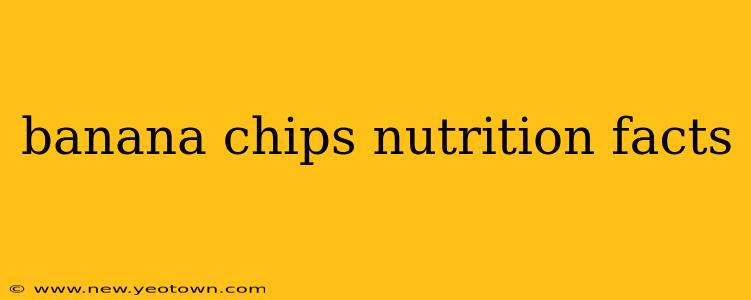Banana chips, those crunchy, sweet delights, have become a popular snack. But beyond their satisfying crunch, what's the nutritional story behind these bite-sized treats? Let's delve into the world of banana chips, exploring their nutritional value, potential health benefits, and things to consider before adding them to your diet.
Imagine this: you're curled up on the couch, a movie playing, and a bag of perfectly crispy banana chips is within reach. That satisfying crunch is hard to resist. But are they as healthy as they seem? The answer, as with most things, is nuanced.
What are the nutritional benefits of banana chips?
Banana chips retain some of the nutritional goodness of fresh bananas, though the levels of certain vitamins and minerals can vary based on processing methods. Generally, they're a source of dietary fiber, potassium, and some vitamins. The fiber content contributes to digestive health, while potassium is crucial for maintaining healthy blood pressure. However, it's important to remember that the nutritional profile is altered during the dehydration process.
Are banana chips good for weight loss?
This is a question with no simple yes or no answer. While banana chips contain some fiber, which can promote feelings of fullness, they are also relatively high in calories and carbohydrates compared to fresh bananas. The high carbohydrate content can lead to a rapid spike in blood sugar, potentially hindering weight loss efforts. Moderation is key. Enjoying a small handful as an occasional treat is far different from consuming large quantities regularly.
How many calories are in banana chips?
The calorie count in banana chips varies depending on the brand and the type of banana used (plantains often make their way into chip production). However, a typical serving (about one ounce) can range from 130 to 150 calories. This number is significantly higher than the calorie count in an equivalent serving of fresh bananas.
What are the differences between different types of banana chips?
You'll find variations in banana chips, including differences in sweetness, texture, and even the type of banana used. Some are made from plantains, resulting in a slightly different flavor and texture compared to chips made from regular bananas. The method of processing can also impact the final product, with some chips being fried (adding extra fat and calories) and others baked or dehydrated. Always check the nutrition label to understand the specifics of your chosen brand and variety.
Are banana chips healthy?
The healthfulness of banana chips is a matter of balance and moderation. They offer some nutritional benefits like fiber and potassium, but their higher calorie and carbohydrate content should be considered, particularly if you're watching your weight or blood sugar. Choosing baked or dehydrated varieties over fried ones is generally a healthier option.
How to incorporate banana chips into a healthy diet?
Instead of viewing banana chips as a standalone snack, try incorporating them mindfully. A small handful could complement a bowl of yogurt or be added to a trail mix for a boost of sweetness and texture. Remember, portion control is essential.
The Bottom Line:
Banana chips offer a convenient and tasty snack, but they aren't a miracle food. They’re best enjoyed in moderation as part of a balanced diet. By being aware of their nutritional profile and making informed choices, you can enjoy this crispy treat without compromising your health goals. Ultimately, choosing baked or dehydrated options and practicing portion control will help you reap the benefits while avoiding potential drawbacks.

